Lead Iranian nuclear negotiator, Ali Bagheri Kani, held consultations with the Qatari Minister of State at the Ministry of Foreign Affairs Dr. Mohammed bin Abdulaziz bin Saleh Al Khulaifi.
The consultations touched on de-escalation efforts between Tehran and the West, breaking the stalemate in nuclear deal talks, and moving forward with the deal to release Iranian frozen assets in return for the release of American hostages detained in Tehran.
Iran’s state media reported that the two officials discussed ways to improve bilateral ties.
Iran’s foreign ministry revealed in a statement that Al Khulaifi stressed that “the continuous consultations between both countries are an indicator of the mutual will to remove the obstacles facing the development of ties and to open new cooperation channels”.
Doha intends to “expand economic ties with Iran”, stated Al Khulaifi.
Before the consultations, Iranian Foreign Minister Hossein Amir Abdollahian received Al Khulaifi and his accompanying delegation.
According to a photo published by Iran’s foreign ministry on its website, the Iranian FM received a written letter from Qatari officials.
IRNA didn’t disclose further details about the meeting but a few hours before the arrival of the Qatari delegation, it mentioned that the visit seeks to discuss bilateral ties and the Qatari de-escalation efforts between Iran and the West and to facilitate nuclear deal talks and remove obstacles hindering the prisoners' swap deal between Iran and the US.
The US will send additional F-35 and F-16 fighter jets, along with a warship to the Middle East, the Pentagon said on Monday, in a bid to monitor key waterways in the region following Iran's seizure and harassment of commercial shipping vessels in recent months.
Moreover, Al Khulaifi met with the Secretary of the Supreme National Security Council (SNSC) of Iran Ali Ahmadian, and handed him a written letter from the Emir of Qatar Sheikh Tamim bin Hamad Al Thani.
The Qatari Ministry of Foreign Affairs revealed in a statement that the two sides discussed ways to bolster bilateral cooperation relations, and several regional and international issues of mutual interest.
On June 21, Doha hosted talks between Bagheri-Kani and European Union foreign policy official Enrique Mora, who is coordinating talks on reviving the nuclear deal.
Before Doha, Bagheri-Kani met with envoys from the UK, France, and Germany on June 12.
In both meetings, he received European warnings about keeping the sanctions and restrictions scheduled to be lifted by the nuclear deal in October.
During the past months, Doha attempted to mediate between Iran and the US after the nuclear talks were stalled.









